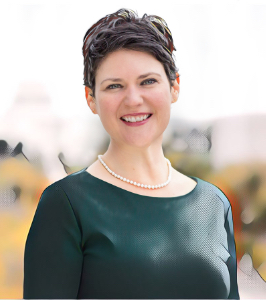Creating a faith freedom nation
We as Americans are not united by our faith or religion. What draws us together is our commitment to standing up for each person’s religious freedom as we would our own.

As I write to you, we as a country have just observed the 20th anniversary of the 9/11 attacks. We remember and grieve the 2,977 people killed that fateful day. We also recall the trauma inflicted on our society by this previously unimaginable terrorism.
Over the past two decades, we have continued a national conversation about what defines us as Americans and what it means to be patriotic. Some of our instincts, inspired and fueled by fear, have been isolationist and exclusionary. We have seen a steady rise in the number and intensity of domestic hate crimes, including those inflicted against our Muslim, Sikh and Jewish brothers and sisters. Policy influenced by religious bigotry and intolerance, such as the Muslim and African travel bans instituted by the Trump administration and upheld by a majority of the the U.S. Supreme Court, also bears tragic witness to this trend.
We also have seen a narrowing definition of our national identity as a “Christian nation,” one that interprets the formation of the United States as providentially inspired and created for the propagation of Christianity and the preferencing of Christians. This ideology largely ignores the evils of race-based slavery, thereby erasing the stories of millions of Americans from this idealized version of history.
But, thankfully, some of our reactions have been more generous and more abundant. In the days immediately following 9/11 and on several later occasions, then-President George W. Bush spoke pointedly about not targeting Muslims for the isolated actions of extremist terrorists. In communities across the country, interfaith groups of neighbors came out to support the families and friends of hate crime victims. Religious pluralism continues to flourish in our country; we have a broad diversity of faiths and a growing number of Americans who do not claim a given religious tradition at all.
Over the past two years, BJC has helped lead a national exploration of Christian nationalism and specifically what a Christian response to Christian nationalism can look like. Tens of thousands of people have engaged with the Christians Against Christian Nationalism campaign, using new resources to help understand and explain white Christian nationalism and work to dismantle it.
These responses are examples of what we explore more in depth in this issue about how we can cultivate a Faith Freedom Nation. We as Americans are not united by our faith or religion. What draws us together is our commitment to standing up for each person’s religious freedom as we would our own.
Creating a faith freedom nation takes intentional work and patient listening. There is no dominant religion in a faith freedom nation. Even being religious is not the default state of being in a faith freedom nation. Instead, there is liberty for people to exercise or choose not to exercise their faith without infringing on the choices of other people.
This summer, BJC engaged in some of this flourishing work of building a faith freedom nation. After a one-year hiatus due to the COVID-19 pandemic, we saw the return of our BJC Fellows program. I, along with four other members of the BJC staff, gathered with eight remarkable young professionals in Colonial Williamsburg to learn from each other and from other scholars in our BJC community. Our timing was fortunate, as we were able to safely gather before the delta variant made in-person events — even for the vaccinated — more dangerous again.
I was reminded that there is simply no substitute for the power of in-person connection and collaboration. On the last morning of our seminar, our group reflected on the increased energy and stamina we found as we returned to our homes across the country. I encourage you to read more about the experiences of our newest BJC Fellows in their own words. I cannot wait to see what these new advocates for faith freedom will do in their communities and contexts.
While we encountered many obstacles over the past two decades to the creation of a faith freedom nation, we also had clear opportunities to advocate for our neighbors as for ourselves. As Christian nationalism has become more pronounced, we have been able to name it, recognize it, call it out, and point to a better and more uniting path of religious freedom for all. I am grateful that you are working with us as we continue to build a faith freedom nation.
Amanda Tyler is executive director of BJC. Follow her on Twitter: @AmandaTylerBJC.
This column first appeared in the fall 2021 edition of Report from the Capital. You can download it as a PDF or read a digital flip-through edition.




